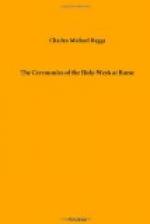[Sidenote: Mass of Pope Marcellus.]
The mass sung on this day is that of Pierluigi da Palestrina, called the mass of Pope Marcellus; not because it was composed during his pontificate; but because, according to Baini, Pierluigi had intended to dedicate a work to that Pope, to whom he was grateful and attached, but was disappointed by His Holiness’ premature death; and therefore he persuaded Card. Vitellozzi to give it that name in honour of his former patron. This is the celebrated mass, which rescued ecclesiastical music from the dangers which surrounded it in the Pontificate of Pius IV (as we have related in The Papal Chapel, Rome, 1839), and not of Marcellus II, as Baini has proved. It is said, that when it was first sung in the papal chapel, the Card. dean Francesco Pisani was so enraptured with it, that he exclaimed with Dante, Paradise, Canto X.
Render e questo voce a voce in tempra
Ed in dolcezza, ch’ esser non
puo nota
Se non cola dove il gioir s’insempra.
to whom, with all the readiness of the bucolic shepherds, whom this classic soil even now produces, Card. Sorbelloni, the Pope’s cousin, replied:
Risponda dunque; O beata sorte! Risponda alla divina cantilena Da tutte parti la beata Corte, Si ch’ ogni vista ne sia pia serena.
Baini Mem. Stor. T. 1.
[Sidenote: Ceremonies at S. John Lateran’s.]
The ceremonies of holy-week are performed at S. John Lateran’s[128] by the chapter of that protobasilica, and resemble for the most part those which we have already described. On holy-saturday however, in addition to the rites before mentioned, the font of the baptistery is blessed by the Card. Vicar, baptism is solemnly administered there to adults, the newly-baptised are confirmed in the church, ordination is conferred during mass upon candidates, for the priesthood. We shall treat briefly of these various ceremonies.
[Sidenote: Blessing of the fonti: baptistery.]




